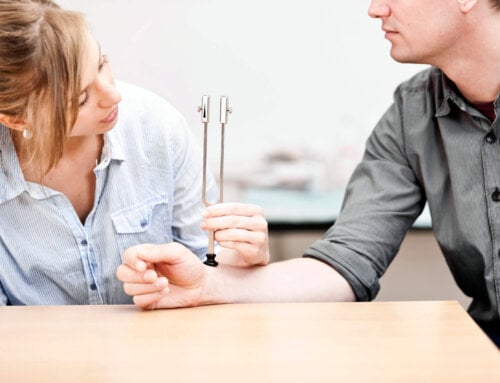8 million adults in the United States discuss balance disorders with their health care providers on a yearly basis. Harvard Health reports “90% of hip fractures are due to falls in people who experience balance issues. Those seniors who take a fall end up with a 20-30% chance of a moderate to severe injury due to poor muscle mass, low bone density and decreased balance.”
Inactivity as we age is a factor in why so many older adults lose their balance. Maintaining flexibility, aerobic capacity, muscle function and balance throughout ones’ lifetime is important protection against various problems. Seniors should be sharpening their reflexes, building core strength, working on speed, agility, and balance continuously to increase mobility and independence. Let’s look at some reasons for balance issues followed by ways to help correct the problem as we age even with diabetes.
- Diabetic neuropathy. 50% of people with diabetes develops some form of neuropathy with the most common form being peripheral neuropathy. Neuropathy is a complication of long-term elevated blood sugars and can affect proprioception which influences balance. Proprioception is the connection of the brain and body to work together for foot placement. Symptoms common to peripheral neuropathy include tingling, burning, numbness and stabbing pain when lying down. It can lead to eventual lack of sensation in the feet and lower legs. Peripheral neuropathy can also be from autoimmune diseases including Lupus and rheumatoid arthritis. Other common reasons are infections like shingles, Lyme disease, or trauma, toxin exposure to heavy metals, vitamin-B deficiencies, chronic back issues, alcoholism and chemotherapy. Neuropathy in the feet is a leading cause of balance issues for people with diabetes. Keeping A1C levels close to 7% is crucial along with staying as active as possible.
- Eye problems. Many times blood sugar elevations can distort vision and cause blurriness which makes your present eyeglass prescription inefficient; this can affect balance. Eye conditions including cataracts, glaucoma and diabetic retinopathy cause interfere with balance.
- Benign positional paroxysmal vertigo. This condition results in balance problems since the inner ear crystals shift causing dizziness. This may happen after being sick or for no specific reason. The crystals can often be repositioned by a health professional in a 15-minute pain free procedure which may need to be repeated several times.
- Medications or combinations of medications. As we age, drugs are absorbed and metabolized differently which can affect balance. Never stop taking your medications even if you think they may be causing dizziness, vertigo or balance issues. Consult your physician or pharmacist and review each medication as well as the combinations you may be taking. They will need to play detective and find out which may be causing you a problem. Medications which may affect balance include OTC sleeping aids as well as prescription sleeping pills, pain medications which are commonly used for chronic back or arthritic problems, blood pressure medications including vasodilators and diuretics (often taken by people with diabetes), antidepressants, anti-anxiety medications, anti-viral medications, and anti-histamines taken for symptoms of colds and allergies, certain cancer drugs or chemotherapy, herbal supplements, narcotics, anti-epileptic medications and certain antibiotics called amino glycosides. You may be able to substitute a different medication which will not give you these symptoms.
- Menieres disease. This is usually caused by a viral infection or allergies and occurs mainly in people between the ages of 40-50. They suffer from vertigo, hearing problems and balance issues linked to excess fluid volume in the inner ear. Decreasing caffeine intake, sodium and alcohol can be beneficial. Using water pills under your medical doctor’s advice can regulate fluid volume as well. Eating and drinking several small meals throughout the day reduces inner ear fluid build up.
- High blood pressure/low blood pressure. Either of these situations can affect balance so make sure you check with your health care provider for proper blood pressure control. For low blood pressure, drink adequate amounts of fluid, stand up slowly and do not cross legs. For high blood pressure, try to lose weight and take medications as prescribed. Start on an aerobic exercise program after medical clearance.
- Decrease in Vestibular function. This is usually an idiopathic condition which means there is no specific cause. It can create a balance loss especially when moving your head from side to side increasing vertigo and nausea. Some causes could be meningitis, cognitive loss or autoimmune disease.
- Spinal Stenosis. A common condition as we age which affects our ability to walk and keep balance. It is when the spinal cord presses against the bones and creates pressure. Often people are given steroid epidural shots to help with swelling and inflammation which can increase blood sugar readings.
These conditions should be checked out by your health care provider.
Here are ways to help maintain your balance through the aging process whether you have diabetes or not.
- Avoid walking in the dark even in your own home. Install lights on motion sensors or keep night lights in rooms where you will be moving around.
- Wear flat or low heeled shoes with a non-slip bottom. Make sure they fit. If you buy shoes that do not have a non-slip bottom, take them to a shoe maker to add a rubber bottom for safety.
- When lying down, first sit up and dangle legs over the side of the bed before coming to a standing position. Do not rush out of bed.
- Install handrails in the shower and hand bars in the bath tub. Place no stick tape or a non slip mat in the tub. Elevate the commode seat on a riser. Use padded mats that grip to the bathroom floor in case you do fall. Do not put down loose area rugs or towels in the bathroom or bedroom.
- If you have a 2-story home install a sturdy handrail and have the staircase well lit.
- Get eyeglass prescriptions checked yearly or if you notice a vision change. Inaccurate vision due to a wrong eyeglass prescription is a leading cause of balance issues in seniors.
- Get a blood pressure monitor and check your blood pressure while standing, sitting and lying down once a month. Notice large variations in positions as well as between the left and right arm. Use an arm cuff not a wrist cuff.
- Never walk barefoot or in plain socks. Purchase no-skid slippers or socks that have grips on the bottom similar to those used in the hospital.
- Do not drag lamp cords or extension cords around rooms. Make a clear walkway to all sitting areas. Avoid clutter on the floor. Put pet toys away each day for an open path. Place rubber or fabric squares around sharp corners on furniture in case you do fall. Never use area rugs.
- Think about using an assist device such as a cane or walker to help with balance. People often feel these aids label them as “old”. They may be life saving in some instances.
How to work on balance issues:
- Practice daily by standing on one foot for 20 seconds and work up to 60 seconds for each side. Use your dominant leg first. You can practice while brushing your teeth, waiting in line, pumping gas or doing the dishes. Begin by holding on to a fixed object with your hand, then 2 fingers and then nothing. As you advance, close your eyes which will require more balance.
- Concentrate by walking heel to toe in a straight line. You can use a wood plank to walk on or an imaginary line. Place one foot directly in front of the other. Focus on an object and not at the floor or your feet. Hold your arms out to the side like wings.
- Hold on to a heavy chair or table and try doing leg lifts to the front, back and side to develop leg strength. Try doing leg squats just with your own body weight.
- Stay at or achieve a healthy weight.
- Get proper sleep which will increase your reaction time and give you increased balance.
- Raise yourself up and down from a soft chair or couch without using your hands to develop hip flexors and leg strength.
- Make sure to have shoes with a wide toe box and an arch support. Look for thick rubbery soles to absorb shock. Replace shoes yearly or every 6 months if the tread on the bottoms wears thin.
- When walking, be familiar with the road or walkway for breaks in the concrete or tree roots to avoid tripping. If walking in the dark, use a head light and reflective gear for protection.
Balance does not have to disappear as we age. Staying active and working on balance along with taking some simple safety measures can protect you from falling. Stay safe!
NOTE: Consult your Doctor first to make sure my recommendations fit your special health needs.













Leave A Comment